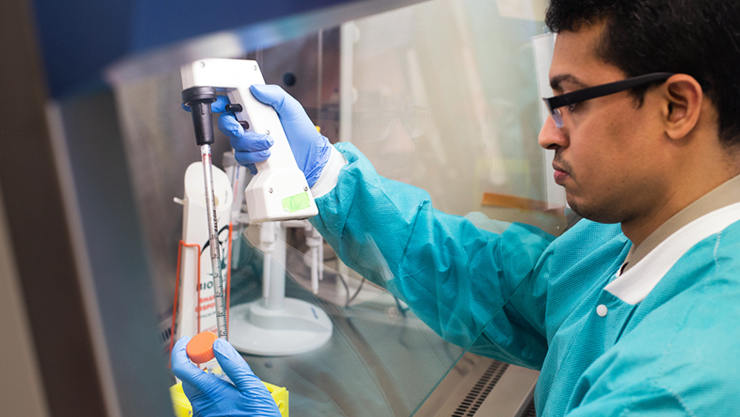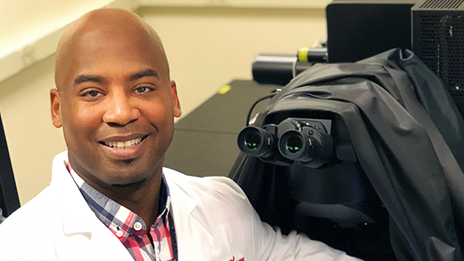As Children’s Research Institute (CRI) launches a new era of pediatric medical innovation, philanthropy provides the rocket fuel. The generosity of private donors and foundations enables our investigators and inventors to take bold leaps that increase the likelihood of breakthroughs that improve children’s lives. Gifts that support early-career scientists can boost new lines of research that can propel prestigious grants from the National Institutes of Health (NIH). Support for bioengineers and investigator-entrepreneurs can serve as a catalyst for transformative devices, apps, and spin-off companies.
The link between philanthropy and innovation is well established at Children’s National Hospital. Almost a decade ago, significant gifts from the people of Abu Dhabi and the family of the late Joseph E. Robert, Jr., created the Sheikh Zayed Institute for Pediatric Surgical Innovation – its mission to make pediatric surgery more precise, less invasive, and pain free. To date, the Institute has spun off seven new companies and has launched, in collaboration with the A. James Clark School of Engineering at the University of Maryland, the U.S. Food and Drug Administration-funded National Capital Consortium for Pediatric Device Innovation.
With the arrival of a new campus for research, innovation and care at Walter Reed, philanthropy will continue to play a prominent role in our work to brighten the futures of children and families. CRI benefits from a large community of benefactors that includes individual donors, corporate philanthropists and foundations. The two examples that follow highlight philanthropy’s vital role for our institution.
Building the Future of Medicine, Gift by Gift
Lynn and Doug Parsons, two of CRI’s most longstanding benefactors, first philanthropically supported Children’s National more than 25 years ago. In 2000, they became early investors in our Center for Genetic Medicine Research. In subsequent years, their numerous gifts to the Center and to CRI—which total more than $1 million—have fueled new discoveries to improve care for vulnerable children.
As the center prepares to become one of the first research programs to move into Walter Reed in 2020 under the leadership of its new director, Eric Vilain, M.D., Ph.D., it aims to accelerate the arrival of precision medicine.
Precision medicine considers each child’s unique makeup—including their genetic code, their medical history, and other biological factors such as the microbiome of gut bacteria—to determine disease-related risks as well as an individualized treatment plans. Dr. Vilain plans to utilize the latest information technologies—such as various forms of sequencing, genome mapping, and data mining—to create a data-driven basic and clinical research platform that will speed the arrival of new treatments and care improvements.
Inspired by Dr. Vilain’s vision for precision medicine, the Parsons recently made a new $700,000 philanthropic commitment to bolster the center’s efforts over the next ten years. This will help the center maximize the potential of Walter Reed as the launch pad for a new era of medical innovation.
Making a Difference for Sickle Cell Patients
Sickle cell disease (SCD)—a deadly inherited blood disorder characterized by sudden, severe pain—impacts 4.4 million people worldwide, a disproportionate number of whom are Africans or of African descent. Children’s National offers the largest, most comprehensive clinical team for pediatric blood disorders in the District of Columbia metropolitan area. Under the guidance of Andrew Campbell, M.D., who became director of Children’s National Comprehensive Sickle Cell Disease Program in 2017, the program treats more than 1,400 children and young adults with all types of SCD—the largest SCD patient population in the U.S. among freestanding children’s hospitals. We are engaged in extensive basic and clinical research to improve outcomes for children with SCD.
The only established cure for SCD is hematopoietic stem cell transplantation, which has an effectiveness rate of more than 90 percent. However, successful transplantation must overcome two difficulties: the need for donor stem cells to be identically matched to the patient’s cells and the risk that the transplantation leads to serious complications such as graft-versus-host disease.
A team of scientists from CRI seeks to overcome these difficulties so that more children can benefit from transplantation, and philanthropic support is fueling their work. The team includes two early-career investigators, Allistair Abraham, M.D., a blood and marrow transplantation specialist, and Robert Nickel, M.D., a hematologist. In October 2017, the Doris Duke Charitable Foundation awarded the pair more than $550,000 in funding to lead a three-year, multi-center trial that will study a low intensity, chemotherapy-free transplantation approach.* “This approach has proven to be effective for adults with sickle cell disease, so we are grateful for the opportunity to begin this important trial for children thanks to the Doris Duke Charitable Foundation,” says Dr. Abraham.
In 2018, Dr. Abraham merited inclusion in the American Society of Hematology-Harold Amos Medical Faculty Development Program (ASH-AMFDP), a partnership between ASH and the Robert Wood Johnson Foundation. This program aims to increase the number of underrepresented minority scholars in the field of hematology and provides more than $400,000 over four years. This philanthropic award will help Dr. Abraham conduct research to refine the technique of partial-match stem cell transplantation—an approach that promises to dramatically expand the availability of transplantation and permit us to improve the lives of more children with SCD.



